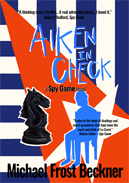
 |
Aiken in Check: A Spy Game Novel –The Aiken Trilogy, Book 3
by Michael Frost Beckner
Montrose Station Press
The protagonist in this thoroughly mind-bending, time-twisting, betrayal-baiting spy novel is Aiken, a senior legal counsel for the CIA. The opening finds him in Havana, Cuba, penning a letter of defection. The letter—its contents, inspirations, explanations, and recriminations—become the fodder for this five-hundred-page tome on the perilous pitfalls of life in the intelligence community. Readers of the first two books in this trilogy, Muir’s Gambit and Bishop’s Endgame, will have an easier time keeping the players on the appropriate teams, but first-timers to author Beckner’s elongated tale can still enjoy the final lap without having taken the first two.
Aiken is a plus-fifty-year-old who has been at least tangentially involved in a number of CIA activities for multiple decades. It still stings, however, when he’s told that “there isn’t a thing you’ve ever done for the Agency that means all that much to our nation’s security.” While he might not agree with that assessment or anything else for that matter that his Agency nemesis has to say, when the lawyer finds himself in a position to potentially betray his country or save the woman he loves, he knows immediately which course to take. The whys, wherefores, and what-will-become-of-us-all then careen through his reminiscence like pinballs bouncing from person to place to decisions that have led to this particular predicament.
Author Beckner layers Aiken’s chronicle with past, present, and perhaps even future events as the lawyer’s epileptic seizures create a type of disconnected consciousness that enables out-of-body incidents even as his attacks occur. He spices these episodes with ruminations on the very nature of time, space, and matter, bringing intellectual debate to involuntary physical response. But his narrative is not simply cerebral. Beckner is more than adept at creating suspense when the situation calls for it. His depiction of a couple’s harrowing escape not only from Chinese communists but also from their supposed confederates is a compelling sequence that forces one to turn the pages faster and faster.
Throughout this author’s tale, there are situations, scenes, and scenarios that evoke the best of spy scribes, such as the moral ambiguities of John le Carré, the technical precision of Tom Clancy, and the violent impact of Robert Ludlum. However, Beckner puts his own spin on these genre staples, elucidating, illuminating, and bringing on-point insights into play, as when he spells out what the intelligence game is really all about: “We’re in the advantage business. When done perfectly that business is silent and invisible. A Rule of Thumb well worth remembering. James Bond and Tom Cruise fail every mission and cancel all value from what they’ve acquired once they shoot their way out. We go in. No one notices. And we stay as long as we can, hidden in plain sight.”
This is that rare novel that teaches as well as entertains. Even as it raises questions and gives answers, it invites readers to think for themselves about right and wrong, good and evil, loyalty and betrayal, and the real cost of a life lived in service to one’s country rather than one’s self.